- Home
- Thomas Hardy
Complete Works of Thomas Hardy (Illustrated) Page 5
Complete Works of Thomas Hardy (Illustrated) Read online
Page 5
They breakfasted together, Nathan drinking the hot tea with rattling sips, and Egbert thinking as he looked at him that Nathan had never appeared so desirable a man to have about him as now when he was about to give him up.
“Well, good mornen, Mistur Mayne,” Nathan said, as he opened the door to let Egbert out. “And mind this, sir; if they used ye bad up there, th’lt always find a hole to put thy head into at Nathan Brown’s, I’ll warrant as much.”
Egbert stepped from the door, and struck across to the manor-house. The morning was dark, and the raw wind made him shiver till walking warmed him. “Good heavens, here’s an undertaking!” he sometimes thought. Old trees seemed to look at him through the gloom, as they rocked uneasily to and fro; and now and then a dreary drop of rain beat upon his face as he went on. The dead leaves in the ditches, which could be heard but not seen, shifted their positions with a troubled rustle, and flew at intervals with a little rap against his walking-stick and hat. He was glad to reach the north stile, and get into the park, where, with an anxious pulse, he passed beneath the creaking limes.
“Will she wake soon enough; will she be forgetful, and sleep over the time?” He had asked himself this many times since he rose that morning, and still beset by the inquiry, he drew near to the mansion.
Her bedroom was in the north wing, facing towards the church, and on turning the brow of the hill a faint light in the window reassured him. Taking a few little stones from the path he threw them upon the sill, as they had agreed, and she instantly opened the window, and said softly, “The butler sleeps on the ground floor on this side, go to the bow-window in the shrubbery.”
He went round among the bushes to the place mentioned, which was entirely sheltered from the wind. She soon appeared, bearing in her hand a wax taper, so small that it scarcely gave more light than a glowworm. She wore the same dress that she had worn when they first met on the previous Christmas, and her hair was loose as at that time. Indeed, she looked throughout much as she had looked then, except that her bright eyes were red, as Egbert could see well enough.
“I have something for you,” she said softly as she opened the window. “How much time is there?”
“Half an hour only, dearest.”
She began a sigh, but checked it, at the same time holding out a packet to him.
“Here are fifty pounds,” she whispered. “It will be useful to you now, and more shall follow.”
Egbert felt how impossible it was to accept this. “No, my dear one,” he said, “I cannot.”
“I don’t require it, Egbert. I wish you to have it; I have plenty. Come, do take it.” But seeing that he continued firm on this point she reluctantly gave in, saying that she would keep it for him.
“I fear so much that papa suspects me,” she said. “And if so, it was my own fault, and all owing to a conversation I began with him without thinking beforehand that it would be dangerous.”
“What did you say?”
I said,” she whispered, ‘Suppose a man should love me very much, would you mind my being acquainted with him if he were a very worthy man?’ ‘That depends upon his rank and circumstances,’ he said. ‘Suppose,’ I said, ‘that in addition to his goodness he had much learning, and had made his name famous in the world, but was not altogether rich?’ I think I showed too much earnestness, and I wished that I could have recalled my words. ‘When the time comes I will tell you,’ he said, ‘and don’t speak or think of these matters again.’“
In consequence of this new imprudence of hers Egbert doubted if it would be right to correspond with her. He said nothing about it then, but it added a new shade to the parting.
“I think your decision a good and noble one,” she murmured, smiling hopefully. “And you will come back some day a wondrous man of the world, talking of vast schemes, radical errors, and saying such words as the ‘backbone of society,’ the ‘tendency of modern thought,’ and other things like that. When papa says to you, ‘My lord the chancellor,’ you will answer him with ‘A tall man, with a deep-toned voice — I know him well.’ When he says, ‘Such and such were Lord Hatton’s words, I think,’ you will answer, No, they were Lord Tyrrell’s; I was present on the occasion;’ and so on in that way. You must get to talk authoritatively about vintages and their dates, and to know all about epicureanism, idleness, and fashion; and so you will beat him with his own weapons, for he knows nothing of these things. He will criticise you; then he will be nettled; then he will admire you.”
Egbert kissed her hand devotedly, and held it long.
“If you cannot in the least succeed,” she added, “I shall never think the less of you. The truly great stand on no middling ledge; they are either famous or unknown.”
Egbert moved slowly away amongst the laurestines. Holding the light above her bright head she smiled upon him, as if it were unknown to her that she wept at the same time.
He left the park precincts, and followed the turnpike road to Melport. In spite of the misery of parting he felt relieved of a certain oppressiveness, now that his presence at Tollamore could no longer bring disgrace upon her. The threatening rain passed off by the time that he reached the ridge dividing the inland districts from the coast. It began to get light, but his journey was still very lonely. Ultimately the yellow shore-line of pebbles grew visible, and the distant horizon of water spreading like a grey upland against the sky, till he could soon hear the measured flounce of the waves.
He entered the town at sunrise, just as the lamps were extinguished, and went to a tavern to breakfast. At half past eight o’clock the boat steamed out of the harbor, and reached London after a passage of five-and-forty hours.
DESPERATE REMEDIES
This is Hardy’s first printed work, published anonymously in 1871 and written in an epistolary style. It is a tale of ‘mystery, entanglement, surprise, and moral obliquity’, in which Cytherea Graye, beloved by a young architect, Edward Springrove, is forced by poverty to accept a post as lady’s maid to the eccentric Miss Aldclyffe, the woman whom her father had loved but had been unable to marry. Miss Adclyffe’s schemes, the discovery that Edward is already engaged to a woman whom he does not love, and the urgent need to support a sick brother drive Cytherea to accept the hand of Aeneas Manston, Miss Adclyffe’s illegitimate son, a passionate villain, whose first wife is believed to have died in a fire. The consequences of this union and the remarkable denouement make this one of Hardy’s most readable and gripping novels.
The original titlepage
DESPERATE REMEDIES
CONTENTS
I. THE EVENTS OF THIRTY YEARS
II. THE EVENTS OF A FORTNIGHT
III. THE EVENTS OF EIGHT DAYS
IV. THE EVENTS OF ONE DAY
V. THE EVENTS OF ONE DAY
VI. THE EVENTS OF TWELVE HOURS
VII. THE EVENTS OF EIGHTEEN DAYS
VIII. THE EVENTS OF EIGHTEEN DAYS
IX. THE EVENTS OF TEN WEEKS
X. THE EVENTS OF A DAY AND NIGHT
XI. THE EVENTS OF FIVE DAYS
XII. THE EVENTS OF TEN MONTHS
XIII. THE EVENTS OF ONE DAY
XIV. THE EVENTS OF FIVE WEEKS
XV. THE EVENTS OF THREE WEEKS
XVI. THE EVENTS OF ONE WEEK
XVII. THE EVENTS OF ONE DAY
XVIII. THE EVENTS OF THREE DAYS
XIX. THE EVENTS OF A DAY AND NIGHT
XX. THE EVENTS OF THREE HOURS
XXI. THE EVENTS OF EIGHTEEN HOURS
SEQUEL
I. THE EVENTS OF THIRTY YEARS
1. DECEMBER AND JANUARY, 1835-36
In the long and intricately inwrought chain of circumstance which renders worthy of record some experiences of Cytherea Graye, Edward Springrove, and others, the first event directly influencing the issue was a Christmas visit.
In the above-mentioned year, 1835, Ambrose Graye, a young architect who had just begun the practice of his profession in the midland town of Hocbridge, to the north of Christminster, went to Lon
don to spend the Christmas holidays with a friend who lived in Bloomsbury. They had gone up to Cambridge in the same year, and, after graduating together, Huntway, the friend, had taken orders.
Graye was handsome, frank, and gentle. He had a quality of thought which, exercised on homeliness, was humour; on nature, picturesqueness; on abstractions, poetry. Being, as a rule, broadcast, it was all three.
Of the wickedness of the world he was too forgetful. To discover evil in a new friend is to most people only an additional experience: to him it was ever a surprise.
While in London he became acquainted with a retired officer in the Navy named Bradleigh, who, with his wife and their daughter, lived in a street not far from Russell Square. Though they were in no more than comfortable circumstances, the captain’s wife came of an ancient family whose genealogical tree was interlaced with some of the most illustrious and well-known in the kingdom.
The young lady, their daughter, seemed to Graye by far the most beautiful and queenly being he had ever beheld. She was about nineteen or twenty, and her name was Cytherea. In truth she was not so very unlike country girls of that type of beauty, except in one respect. She was perfect in her manner and bearing, and they were not. A mere distinguishing peculiarity, by catching the eye, is often read as the pervading characteristic, and she appeared to him no less than perfection throughout — transcending her rural rivals in very nature. Graye did a thing the blissfulness of which was only eclipsed by its hazardousness. He loved her at first sight.
His introductions had led him into contact with Cytherea and her parents two or three times on the first week of his arrival in London, and accident and a lover’s contrivance brought them together as frequently the week following. The parents liked young Graye, and having few friends (for their equals in blood were their superiors in position), he was received on very generous terms. His passion for Cytherea grew not only strong, but ineffably exalted: she, without positively encouraging him, tacitly assented to his schemes for being near her. Her father and mother seemed to have lost all confidence in nobility of birth, without money to give effect to its presence, and looked upon the budding consequence of the young people’s reciprocal glances with placidity, if not actual favour.
Graye’s whole impassioned dream terminated in a sad and unaccountable episode. After passing through three weeks of sweet experience, he had arrived at the last stage — a kind of moral Gaza — before plunging into an emotional desert. The second week in January had come round, and it was necessary for the young architect to leave town.
Throughout his acquaintanceship with the lady of his heart there had been this marked peculiarity in her love: she had delighted in his presence as a sweetheart should do, yet from first to last she had repressed all recognition of the true nature of the thread which drew them together, blinding herself to its meaning and only natural tendency, and appearing to dread his announcement of them. The present seemed enough for her without cumulative hope: usually, even if love is in itself an end, it must be regarded as a beginning to be enjoyed.
In spite of evasions as an obstacle, and in consequence of them as a spur, he would put the matter off no longer. It was evening. He took her into a little conservatory on the landing, and there among the evergreens, by the light of a few tiny lamps, infinitely enhancing the freshness and beauty of the leaves, he made the declaration of a love as fresh and beautiful as they.
‘My love — my darling, be my wife!’
She seemed like one just awakened. ‘Ah — we must part now!’ she faltered, in a voice of anguish. ‘I will write to you.’ She loosened her hand and rushed away.
In a wild fever Graye went home and watched for the next morning. Who shall express his misery and wonder when a note containing these words was put into his hand?
‘Good-bye; good-bye for ever. As recognized lovers something divides us eternally. Forgive me — I should have told you before; but your love was sweet! Never mention me.’
That very day, and as it seemed, to put an end to a painful condition of things, daughter and parents left London to pay off a promised visit to a relative in a western county. No message or letter of entreaty could wring from her any explanation. She begged him not to follow her, and the most bewildering point was that her father and mother appeared, from the tone of a letter Graye received from them, as vexed and sad as he at this sudden renunciation. One thing was plain: without admitting her reason as valid, they knew what that reason was, and did not intend to reveal it.
A week from that day Ambrose Graye left his friend Huntway’s house and saw no more of the Love he mourned. From time to time his friend answered any inquiry Graye made by letter respecting her. But very poor food to a lover is intelligence of a mistress filtered through a friend. Huntway could tell nothing definitely. He said he believed there had been some prior flirtation between Cytherea and her cousin, an officer of the line, two or three years before Graye met her, which had suddenly been terminated by the cousin’s departure for India, and the young lady’s travelling on the Continent with her parents the whole of the ensuing summer, on account of delicate health. Eventually Huntway said that circumstances had rendered Graye’s attachment more hopeless still. Cytherea’s mother had unexpectedly inherited a large fortune and estates in the west of England by the rapid fall of some intervening lives. This had caused their removal from the small house in Bloomsbury, and, as it appeared, a renunciation of their old friends in that quarter.
Young Graye concluded that his Cytherea had forgotten him and his love. But he could not forget her.
2. FROM 1843 TO 1861
Eight years later, feeling lonely and depressed — a man without relatives, with many acquaintances but no friends — Ambrose Graye met a young lady of a different kind, fairly endowed with money and good gifts. As to caring very deeply for another woman after the loss of Cytherea, it was an absolute impossibility with him. With all, the beautiful things of the earth become more dear as they elude pursuit; but with some natures utter elusion is the one special event which will make a passing love permanent for ever.
This second young lady and Graye were married. That he did not, first or last, love his wife as he should have done, was known to all; but few knew that his unmanageable heart could never be weaned from useless repining at the loss of its first idol.
His character to some extent deteriorated, as emotional constitutions will under the long sense of disappointment at having missed their imagined destiny. And thus, though naturally of a gentle and pleasant disposition, he grew to be not so tenderly regarded by his acquaintances as it is the lot of some of those persons to be. The winning and sanguine receptivity of his early life developed by degrees a moody nervousness, and when not picturing prospects drawn from baseless hope he was the victim of indescribable depression. The practical issue of such a condition was improvidence, originally almost an unconscious improvidence, for every debt incurred had been mentally paid off with a religious exactness from the treasures of expectation before mentioned. But as years revolved, the same course was continued from the lack of spirit sufficient for shifting out of an old groove when it has been found to lead to disaster.
In the year 1861 his wife died, leaving him a widower with two children. The elder, a son named Owen, now just turned seventeen, was taken from school, and initiated as pupil to the profession of architect in his father’s office. The remaining child was a daughter, and Owen’s junior by a year.
Her christian name was Cytherea, and it is easy to guess why.
3. OCTOBER THE TWELFTH, 1863
We pass over two years in order to reach the next cardinal event of these persons’ lives. The scene is still the Grayes’ native town of Hocbridge, but as it appeared on a Monday afternoon in the month of October.
The weather was sunny and dry, but the ancient borough was to be seen wearing one of its least attractive aspects. First on account of the time. It was that stagnant hour of the twenty-four when the practical garishness of Day,
having escaped from the fresh long shadows and enlivening newness of the morning, has not yet made any perceptible advance towards acquiring those mellow and soothing tones which grace its decline. Next, it was that stage in the progress of the week when business — which, carried on under the gables of an old country place, is not devoid of a romantic sparkle — was well-nigh extinguished. Lastly, the town was intentionally bent upon being attractive by exhibiting to an influx of visitors the local talent for dramatic recitation, and provincial towns trying to be lively are the dullest of dull things.
Little towns are like little children in this respect, that they interest most when they are enacting native peculiarities unconscious of beholders. Discovering themselves to be watched they attempt to be entertaining by putting on an antic, and produce disagreeable caricatures which spoil them.
The weather-stained clock-face in the low church tower standing at the intersection of the three chief streets was expressing half-past two to the Town Hall opposite, where the much talked-of reading from Shakespeare was about to begin. The doors were open, and those persons who had already assembled within the building were noticing the entrance of the new-comers — silently criticizing their dress — questioning the genuineness of their teeth and hair — estimating their private means.
Among these later ones came an exceptional young maiden who glowed amid the dulness like a single bright-red poppy in a field of brown stubble. She wore an elegant dark jacket, lavender dress, hat with grey strings and trimmings, and gloves of a colour to harmonize. She lightly walked up the side passage of the room, cast a slight glance around, and entered the seat pointed out to her.

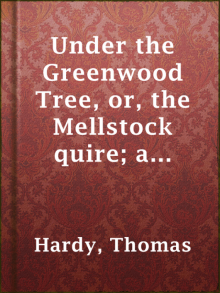 Under the Greenwood Tree; Or, The Mellstock Quire
Under the Greenwood Tree; Or, The Mellstock Quire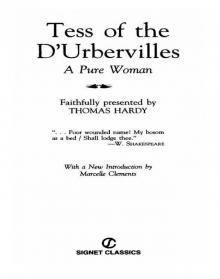 Tess of the D'Urbervilles
Tess of the D'Urbervilles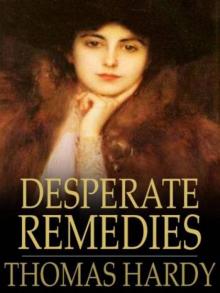 Desperate Remedies
Desperate Remedies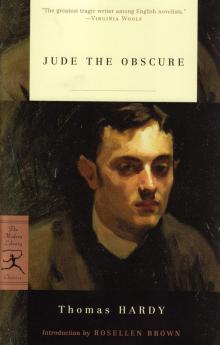 Jude the Obscure
Jude the Obscure Two on a Tower
Two on a Tower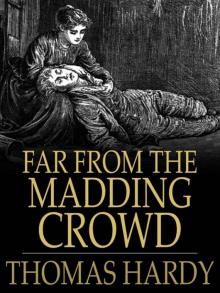 Far from the Madding Crowd
Far from the Madding Crowd The Return of the Native
The Return of the Native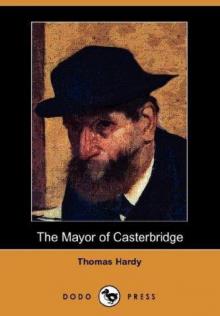 The Mayor of Casterbridge
The Mayor of Casterbridge The Well-Beloved
The Well-Beloved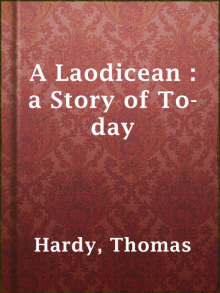 A Laodicean : A Story of To-day
A Laodicean : A Story of To-day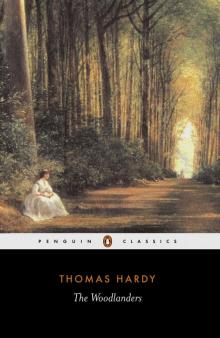 The Woodlanders
The Woodlanders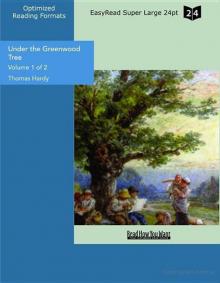 Under the Greenwood Tree
Under the Greenwood Tree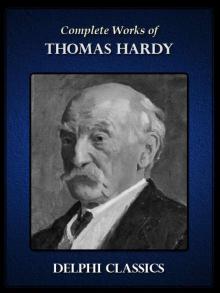 Complete Works of Thomas Hardy (Illustrated)
Complete Works of Thomas Hardy (Illustrated)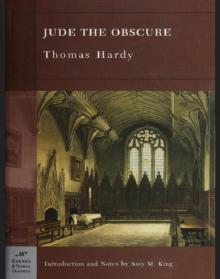 Jude the Obscure (Barnes & Noble Classics Series)
Jude the Obscure (Barnes & Noble Classics Series) The Distracted Preacher
The Distracted Preacher